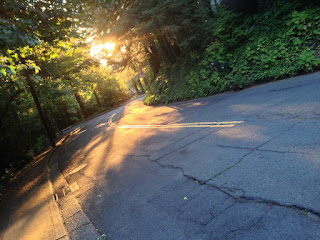Known and Loved
"Honey, all the things that I have seen.
But most amazing of them all
is the grace that we believe:
that we are known and loved,
loved and known."
-Caedmon's Call
I found a moment of real connection at the dentist's office today. Sometimes it's the experiences you expect to be so mundane that can quickly turn eternal like that.
I was talking to the dental hygienist, who turned out to be an interesting, extraordinarily empathetic person, and we had a great conversation. Somewhere along the way, she made the comment that she doesn't think there's another country outside the United States where people are expected to be so happy all the time, and I couldn't believe I was actually getting to hear someone else say what I have been thinking and experiencing for so long.
I jumped in and said, "I know; it's oppressive. I call it 'oppressive happiness'."
I hate to say it, but I've seen this oppressive happiness especially in the church, these walls that we build with smiles, walls that divide us from each other, because if the walls came down, others would see the terrified, shivering, weak souls that we really are, and we believe that they would all judge and reject us for it.
I think that is a lot of the problem: a fear of judgment. And I have both been judged and played the judge. In fact, going with the idea that hurt people hurt people, I think that until we know it is possible to be really seen and really not judged, then we know nothing other than to judge people when we see them for who they really are.
I like the movie Avatar a lot, and here's the part that lodges deepest in my heart: the fact that the greeting of the Na'avi tribe in the movie is, "I see you." Not, "Hey! How are you?" when really we aren't that interested, but this deep act of communion where one creature looks at another, straight into their eyes, soul to soul, and says, "I see you."
But I think that our culture in general is terrified of being seen. Have you noticed how often, if there is any sort of "down time", any moment when people are around each other and not engaged in an activity, someone will pull out a cell phone and become intently interested in it? I have found myself, in moments where I really feel emotionally exposed and vulnerable, pretending to be riveted with a piece of carpeting on the floor. Have you had that experience?
This fear of being seen hit home when I was taking an acting class in Manhattan. Our teacher asked us to stand in front of the class, arms at our sides, and just stand there. Oh my goodness, it was the scariest and most vulnerable feeling. I was struck by how difficult it was. I suddenly realized why teenage girls usually stand with their weight on one leg, other knee cocked to the side (I started doing this when I was around 12 or 13 because I saw this really pretty girl doing it). Or why we so often cross our arms in front of us for some sort of protection. Standing in a neutral pose in front of others makes you feel very unprotected.
I started trying it on crowded subway platforms. While so many people around me were reading, or listening to music in headphones, or talking to someone, or standing with their weight on one leg, other knee cocked to the side, I tried just standing there. Neutral pose. Arms at my sides, legs shoulder-width apart. Gosh, it was awkward at first. And it felt very brave somehow, and I felt very exposed.
But that simple public exercise I think helped me a lot as an actress, and maybe even as a human being. It was like picking up the courage to just be me in the middle of a lot of people, where I felt watched and seen.
The Bible has a lot of names for God, and as I get to know him better and better, I've come to cherish certain names based on the ways he has made himself known to me. For example, after a recent period of emotional healing, there's now a special place in my heart for the name "Jehovah Raphah", one of God's names in the Bible. In Hebrew, it means, "the Lord that heals". Now, when I call God Jehovah Raphah as I talk to him (pray), it is like this beautiful nickname between us, full with the meaning of intimate moments that only he and I have shared.
In the first book of the Bible, Genesis, in chapter 16, there is a story told about Abraham and his wife, Sarai, who couldn't have children in a culture where children were a mark of status. Sarai gets so discouraged that she finally throws up her hands and gives her maidservant, Hagar, to Abraham, for him to sleep with so that they can create a descendant. Hagar becomes pregnant and starts despising Sarai. Sarai blames it on Abraham, and then mistreats Hagar. So Hagar runs away into the desert, a woman seemingly alone, crying out to no one.
But the angel of the Lord comes and speaks to Hagar, telling her, among other things, that, "the Lord has heard of your misery." And here is Hagar's reply in Genesis 16:13:
She gave this name to the LORD who spoke to her: “You are the God who sees me,” for she said, “I have now seen the One who sees me.”
El Roi is the name for God that comes from this verse, and in Hebrew it means, "the God who sees me".
And 1 John chapter 4, verse 8, says that not only is God loving, but that God actually is love.
So, let this one soak in:
El Roi is love.
The God who sees you is love.
But most amazing of them all
is the grace that we believe:
that we are known and loved,
loved and known."
-Caedmon's Call
I found a moment of real connection at the dentist's office today. Sometimes it's the experiences you expect to be so mundane that can quickly turn eternal like that.
I was talking to the dental hygienist, who turned out to be an interesting, extraordinarily empathetic person, and we had a great conversation. Somewhere along the way, she made the comment that she doesn't think there's another country outside the United States where people are expected to be so happy all the time, and I couldn't believe I was actually getting to hear someone else say what I have been thinking and experiencing for so long.
I jumped in and said, "I know; it's oppressive. I call it 'oppressive happiness'."
I hate to say it, but I've seen this oppressive happiness especially in the church, these walls that we build with smiles, walls that divide us from each other, because if the walls came down, others would see the terrified, shivering, weak souls that we really are, and we believe that they would all judge and reject us for it.
I think that is a lot of the problem: a fear of judgment. And I have both been judged and played the judge. In fact, going with the idea that hurt people hurt people, I think that until we know it is possible to be really seen and really not judged, then we know nothing other than to judge people when we see them for who they really are.
I like the movie Avatar a lot, and here's the part that lodges deepest in my heart: the fact that the greeting of the Na'avi tribe in the movie is, "I see you." Not, "Hey! How are you?" when really we aren't that interested, but this deep act of communion where one creature looks at another, straight into their eyes, soul to soul, and says, "I see you."
But I think that our culture in general is terrified of being seen. Have you noticed how often, if there is any sort of "down time", any moment when people are around each other and not engaged in an activity, someone will pull out a cell phone and become intently interested in it? I have found myself, in moments where I really feel emotionally exposed and vulnerable, pretending to be riveted with a piece of carpeting on the floor. Have you had that experience?
This fear of being seen hit home when I was taking an acting class in Manhattan. Our teacher asked us to stand in front of the class, arms at our sides, and just stand there. Oh my goodness, it was the scariest and most vulnerable feeling. I was struck by how difficult it was. I suddenly realized why teenage girls usually stand with their weight on one leg, other knee cocked to the side (I started doing this when I was around 12 or 13 because I saw this really pretty girl doing it). Or why we so often cross our arms in front of us for some sort of protection. Standing in a neutral pose in front of others makes you feel very unprotected.
I started trying it on crowded subway platforms. While so many people around me were reading, or listening to music in headphones, or talking to someone, or standing with their weight on one leg, other knee cocked to the side, I tried just standing there. Neutral pose. Arms at my sides, legs shoulder-width apart. Gosh, it was awkward at first. And it felt very brave somehow, and I felt very exposed.
But that simple public exercise I think helped me a lot as an actress, and maybe even as a human being. It was like picking up the courage to just be me in the middle of a lot of people, where I felt watched and seen.
The Bible has a lot of names for God, and as I get to know him better and better, I've come to cherish certain names based on the ways he has made himself known to me. For example, after a recent period of emotional healing, there's now a special place in my heart for the name "Jehovah Raphah", one of God's names in the Bible. In Hebrew, it means, "the Lord that heals". Now, when I call God Jehovah Raphah as I talk to him (pray), it is like this beautiful nickname between us, full with the meaning of intimate moments that only he and I have shared.
In the first book of the Bible, Genesis, in chapter 16, there is a story told about Abraham and his wife, Sarai, who couldn't have children in a culture where children were a mark of status. Sarai gets so discouraged that she finally throws up her hands and gives her maidservant, Hagar, to Abraham, for him to sleep with so that they can create a descendant. Hagar becomes pregnant and starts despising Sarai. Sarai blames it on Abraham, and then mistreats Hagar. So Hagar runs away into the desert, a woman seemingly alone, crying out to no one.
But the angel of the Lord comes and speaks to Hagar, telling her, among other things, that, "the Lord has heard of your misery." And here is Hagar's reply in Genesis 16:13:
She gave this name to the LORD who spoke to her: “You are the God who sees me,” for she said, “I have now seen the One who sees me.”
El Roi is the name for God that comes from this verse, and in Hebrew it means, "the God who sees me".
And 1 John chapter 4, verse 8, says that not only is God loving, but that God actually is love.
So, let this one soak in:
El Roi is love.
The God who sees you is love.



Comments
Post a Comment